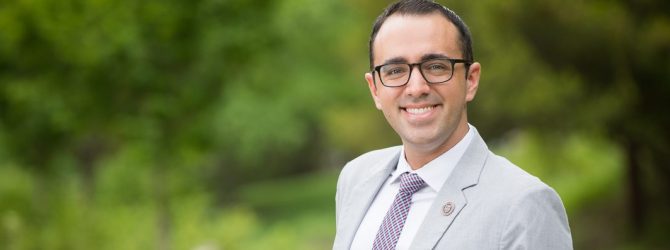Peter Cody Fiduccia graduated from CIPA in May of 2017 with a concentration in Public and Nonprofit Management. He is currently enrolled in a PhD program in Education and Spatial Statistics at Cornell University.
Why CIPA? There are a lot of MPA programs around—what made you choose CIPA over other programs you were considering?
I chose CIPA because of its deep integration into the Cornell University academic community. Other MPA programs may be a part of prestigious institutions, but none live the mission of connecting to deeply talented researchers and cultivating experiential opportunities like CIPA.
What are your long-term career goals? How did CIPA help prepare you for these?
After PhD studies, I’m aiming for a faculty position at a top research university with plans to continue into higher education administration. CIPA helped me augment my private sector training (MBA) with a wide variety of public sector tools, knowledge, and capabilities. The resources within the program were crucial in allowing me to emerge with a set of skills that will allow me to work with professionals within the education sphere.
What would you tell a prospective student who asked you to list the top three reasons that CIPA was a good fit for you?
- Access to world-class research and faculty
- Strong, supportive community
- Autonomy in course selection and career planning
Are there any particular “stand out” experiences at CIPA that made a lasting impact on you?
-Quantitative research methods course with Dr. John Sipple: This was my first ‘deep dive’ into statistical methodologies and research methods. I emerged from the class with an incredibly enhanced level of knowledge, and through the coursework found a passion which would carry through the rest of my MPA career.
-Systems Thinking with Drs. Derek and Laura Cabrera: This was a total mind flip of a course in the best possible way. Learning how to ‘think using DSRP’ proved to be a fundamental change in how I analyze, observe, and plan to solve problems (both simple and wicked). The Cabreras’ support and constructive challenges forced me to become a better researcher.
-Cornell Policy Review: Serving as an Associate Editor and then the Editor-In-Chief of the University’s Policy Journal was a transformative experience. Working with extremely talented contributors from the CIPA program to outside Cornell added to my professional and persoPublinal growth. I will always be thankful to have been able to lead a team of such impressive public policy practitioners.
How would you describe the sense of community you find at CIPA?
Because of my various appointments, I felt I had a deeper community connection to the staff than to the students in CIPA. Though my team at the Policy Review provided a great sense of community, most of my interactions were with the staff. From when I began working the summer prior to starting the program to the day of graduation, they were there to support, cheer for, and help me through anything that came my way. I found a second family in the CIPA students and staff, without whom I would have been lost on my ‘road to Ithaka.’
Is there anything else about the CIPA program, about the opportunities here, or about your particular experience that you would like to share with prospective students?
Take advantage of whatever opportunities you can during what I can promise you will be two short years at Cornell. Go to a physics lecture. Sit on the slope. Try some new food. Hike a gorge. Attend one of the many musical performances on campus. Join a club outside of CIPA. E-mail a faculty member you’ve always looked up to and set up a meeting. You’re in the presence of some of the greatest minds (bourgeoning and wise) on the planet – soak it all in.

